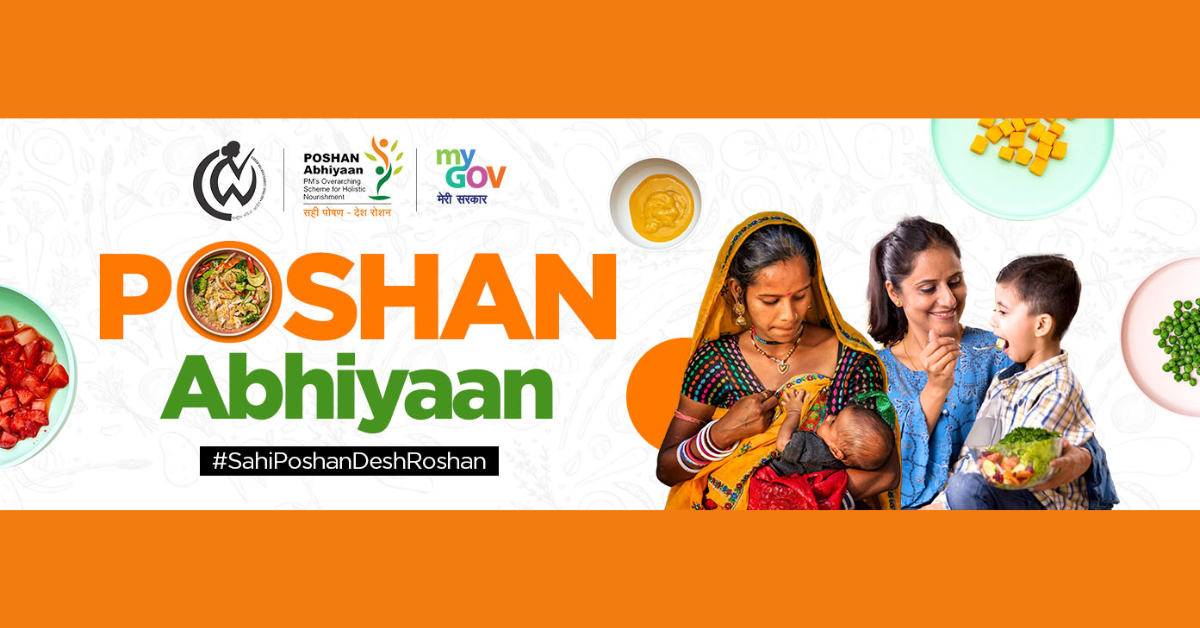Poshan Abhiyaan, also known as the National Nutrition Mission, is a flagship initiative launched by the Government of India to tackle malnutrition and improve the nutritional status of children, pregnant women, and lactating mothers. Introduced in 2018, Poshan Abhiyaan aims to create a malnutrition-free India by promoting holistic nutrition and addressing the critical gaps in health and nutrition across the country.
This comprehensive program focuses on ensuring convergence across various nutrition-related schemes, promoting behavioral changes, and leveraging technology to achieve measurable results in reducing stunting, undernutrition, anemia, and low birth weight.
Objectives of Poshan Abhiyaan
The primary goals of Poshan Abhiyaan include:
- Reducing Malnutrition:
- Decrease stunting, undernutrition, and wasting in children below 6 years of age.
- Addressing Anemia:
- Lower anemia rates among children, adolescent girls, and women (especially pregnant and lactating mothers).
- Promoting Holistic Nutrition:
- Encourage a lifecycle approach to nutrition, focusing on the first 1,000 days of life (from conception to two years of age).
- Improving Awareness:
- Generate awareness about proper nutrition and healthy practices through campaigns like Jan Andolan.
- Leveraging Technology:
- Use ICT (Information and Communication Technology) for real-time monitoring and improved delivery of services.
Key Features of Poshan Abhiyaan
- Targeted Approach:
- The program targets children under six years of age, pregnant women, lactating mothers, and adolescent girls.
- Convergence of Schemes:
- It integrates various government schemes like ICDS (Integrated Child Development Services), NHM (National Health Mission), and Swachh Bharat Mission to provide a comprehensive solution to malnutrition.
- Use of Technology:
- Mobile-based applications, such as the ICDS-CAS (Common Application Software), enable real-time data monitoring and effective tracking of beneficiaries.
- Jan Andolan (Mass Movement):
- A people-driven campaign encouraging community participation to improve nutrition outcomes.
- Behavioral Change Communication (BCC):
- Focus on educating families about the importance of nutrition, hygiene, breastfeeding, and complementary feeding practices.
- Poshan Panchayats:
- Platforms at the grassroots level to create awareness, track progress, and address nutrition-related challenges.
Achievements of Poshan Abhiyaan
Since its inception, Poshan Abhiyaan has made remarkable progress in tackling malnutrition:
- Reduction in Malnutrition Indicators:
- States implementing the program have reported improvements in stunting, wasting, and undernutrition rates among children.
- Increased Awareness:
- Campaigns like Poshan Maah (Nutrition Month) and Poshan Pakhwada (Nutrition Fortnight) have significantly raised awareness about healthy dietary practices.
- Use of Technology:
- Mobile applications and digital tools have improved the efficiency of service delivery and beneficiary monitoring.
- Community Participation:
- Initiatives such as Jan Andolan have empowered communities to take ownership of nutrition outcomes.
- Strengthened Infrastructure:
- Anganwadi Centers (AWCs) have been upgraded with better facilities and services to support early childhood care and education.

Challenges in Implementation
While Poshan Abhiyaan has achieved significant progress, several challenges remain:
- Limited Awareness in Rural Areas:
- Despite awareness campaigns, rural and tribal populations often lack knowledge about proper nutrition practices.
- Underutilization of Technology:
- Inadequate infrastructure and digital literacy in remote areas hinder the effective use of technology.
- Inadequate Funding:
- Budget constraints limit the scope of interventions in certain states.
- Coordination Issues:
- Ensuring convergence among multiple government departments and schemes remains a challenge.
- Quality of Data:
- Accurate and real-time data collection is often inconsistent, leading to gaps in monitoring and evaluation.
Steps for Improvement
To address these challenges, the following measures can be implemented:
- Enhanced Awareness Campaigns:
- Strengthen outreach efforts through community leaders, Anganwadi workers, and media to reach marginalized populations.
- Improved Technology Access:
- Invest in better infrastructure and provide training for frontline workers to effectively use digital tools.
- Increased Budget Allocation:
- Ensure adequate funding for nutrition-related programs to enhance their reach and impact.
- Better Convergence of Schemes:
- Improve inter-departmental coordination to deliver nutrition interventions effectively.
- Community-Led Monitoring:
- Encourage local participation to monitor progress and ensure accountability at the grassroots level.
Success Stories of Poshan Abhiyaan
- Rajasthan’s Poshan Champions:
- Community-driven initiatives have led to significant reductions in anemia and stunting among children.
- Madhya Pradesh’s Technology Adoption:
- The state’s use of mobile applications for tracking beneficiaries has improved service delivery.
- Tamil Nadu’s Model Anganwadi Centers:
- Upgraded infrastructure and nutrition-focused programs have enhanced the quality of early childhood care.
- Bihar’s Community Engagement:
- The Jan Andolan campaign has mobilized local communities to promote better nutrition practices.
Conclusion
Poshan Abhiyaan is a transformative initiative that addresses one of India’s most pressing issues – malnutrition. By integrating technology, promoting behavioral changes, and ensuring convergence of government schemes, the program has made substantial strides toward achieving a malnutrition-free India. However, to realize its full potential, the challenges of implementation, funding, and awareness must be tackled with a renewed focus on community participation and innovation. With sustained efforts, Poshan Abhiyaan can pave the way for a healthier and more nourished future for India.


